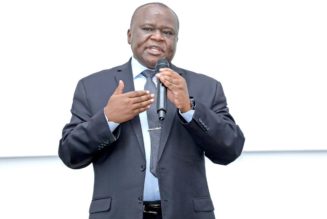Companies
Equity, KCB pile pressure on Safaricom in profitability race
Wednesday March 29 2023
Equity Group Executive Director, Mary Wamae, Group Board Chairman Isaac Macharia, Group MD and CEO, James Mwangi and Group Chief Operating Officer, Samuel Kirubi during the full year 2022 investor briefing. FILE PHOTO | POOL
Equity Group has narrowed the profit gap with Safaricom to the smallest in eight years, leading a banking sector onslaught in the race for East Africa’s most profitable company.
The bank on Tuesday reported a 15 percent growth in net profit to Sh46.1 billion for the year ended December 2022, cutting the earnings gap with telco by close to Sh32 billion in three years.
This follows a back-to-back profit drop by Safaricom in the year ended March 2022.
Safaricom’s profit machine has looked unassailable over the past decade, driven by remarkable innovation.
But the telco’s net earnings, which stood at Sh67.5 billion in the year ended March 2022, are now 1.46 times that of Equity compared to 3.66 times more in 2020 when the telco’s profits peaked.
Safaricom has between March 2020 and March last year seen a Sh6.16 billion drop in net profit as Equity added Sh26 billion between December 2020 and December last year.
Equity has in the process displaced KCB to perch itself at the top of the earnings chart of Kenya’s banking sector.
This is the third straight year with net earnings above KCB.
The profit gap has in the process narrowed by Sh31.97 billion from Sh53.57 billion in 2020 to Sh21.4 billion, as Safaricom’s voice revenue stuttered and Ethiopia’s entry cost cut the profits.
KCB is also piling the pressure on Safaricom, with the lender’s net profit having risen by 19.5 percent to Sh40.8 billion.
As the telco’s traditional business—voice and text messaging—declines on continued shift to Internet calls and messaging apps like WhatsApp, it is now counting more on mobile money and data business.
Read: Equity net profit rises 15pc to record Sh46bn
But banks, disrupted by M-Pesa in 2007, have been rolling out digital capabilities that have seen them enter into the digital transaction space to claim a share of the billions of shillings.
The digital business, added to the traditional business of deposit-keeping and lending, has seen banks take on Safaricom, which is now betting on the Ethiopian market to accelerate profit growth.
But banks, led by Equity, are not only actively playing in the digital financial space but also deepening their reach in markets such as DRC Congo, Uganda, and Tanzania and have their eyes on Ethiopia should the window open.
They have also turned the digital disruption into an opportunity to grow non-funded income as more customers transact online. This has given banks an impetus for growth beyond traditional business models.
Equity has, for instance, seen its digital banking overtake branches both in the number and value of transactions, delivering a reduction in fixed and variable costs.
The bank has raided Safaricom’s Lipa na M-Pesa space through its Lipa na Equity product.
Equity Group CEO James Mwangi said the bank turned the Covid-19 crisis into a “major asset”, using it as a tailwind to accelerate digital banking.
“We are reinforcing it [the digital uptake] by creating e-commerce links. One of our best-performing products now is Lipa na Equity. The use of cash is significantly reducing as people do digital payment and that for us is the biggest take-off,” said Mr Mwangi.
Now, Mr Mwangi is dreaming of newer heights, having watched the lender’s assets and deposits, each zoom past the Sh1 trillion mark. He joined in 1994 as a finance, operations and strategy director.
“This story of Equity is consistent. It is also the story of resilience. If a financial crisis came, Equity will weather it the way it weathered the interest rate capping shock and the Covid-19 pandemic shock,” said Mr Mwangi.
Equity has crafted an Africa recovery and resilience plan and now wants to take its dream to the continent by targeting high-impact sectors such as agriculture, mining, manufacturing, and trade.
The outcome of this plan, Mr Mwangi said, will include winning 100 million customers and five million borrowing businesses by 2030.
Mr Mwangi said Equity’s subsidiaries like Rwanda have since surpassed Kenya in terms of the return on assets and return on equity and are likely to contribute 50 percent of the group’s profit this year, up from 27 percent.
It took Kenya almost 14 years to reach a four percent return on assets but 11 years for Rwanda.
Read: Safaricom Ethiopia grows number of subscribers to 2.8m
“Uganda is likely to hit this level this year and there is a very good showing in DRC and Tanzania. By 2025, we will be dealing with a completely mature group and achieve a four percent return for the entire group. You can put into perspective what that will mean,” said Mr Mwangi.
Mr Mwangi thinks he has finally found the secret to becoming number one and staying there, and it lies DRC— home to Equity’s most profitable subsidiary.
In DRC, Mwangi said, the bank seems to have touched “a juggler pipe that will change this group forever.”
“If there is one country that this group will most likely be defined by, it is the DRC. Those who call DRC the jewel in the crown, I agree with them,” he quipped in 2021.








